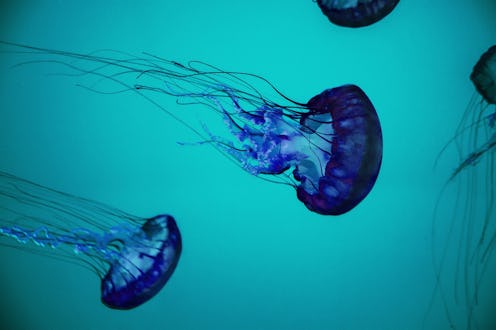News
A Florida Jellyfish Mob Just Stung 400 People
There's nothing worse than floating peacefully in the clear, blue, tranquil ocean and suddenly feeling a jolt of pain come out of nowhere. One minute you're completely relaxed, and the next you're frantically searching for the source of the sting, fists raised. Well, if you happened to be in central Florida this weekend, you'd have been far from alone as more than 400 people were stung by jellyfish off Daytona Beach and New Smyrna Beach when a large swarm of jellyfish washed toward shore.
Authorities believe that the jellyfish mob arrived on Friday and has remained in the New Smyrna Beach area since. When lifeguards began noticing throngs of people yelling, "Ow! What was that?!" and coming on shore with red marks during the weekend, they raised the purple flag, which signals hazardous marine life like jellyfish or sharks. One can imagine how terrifying it must be to be neck-deep in the water, treading water idly when you see that purple flag being raised.
Luckily, none of the Florida beachgoers were seriously injured, only extremely irritated, presumably. To quell the pain, lifeguards poured vinegar, which is known to ease the burn of jellyfish sting, over swimmers' stings.
Jellyfish sting by injecting venom into their target through their long tentacles. Stings can vary in severity, depending on how allergic the victim is to the animal's toxins. Jellyfish attacks are frustratingly difficult to avoid or predict since it can be difficult to spot them in the water.
Although the incident was relatively harmless, jellyfish attacks can be deadly. On Saturday, across the world on the island of Koh Phangan in Thailand, a five-year-old French boy died from a jellyfish sting. The boy, who was on vacation with his family, was stung by a box jellyfish, the most poisonous of its species, and considered to be one of the most deadly animals on the planet.
If you get stung, splash the affected area with vinegar. If you don't have any on hand, use sea water. Do not wash the sting with fresh water, which could reactivate the stinging cells left behind. And if you notice more serious symptoms, such as nausea, vomiting, muscle and joint problems, fever, loss of consciousness, or difficulty breathing, seek medical attention immediately. You could be having a severe allergic reaction to the sting.
